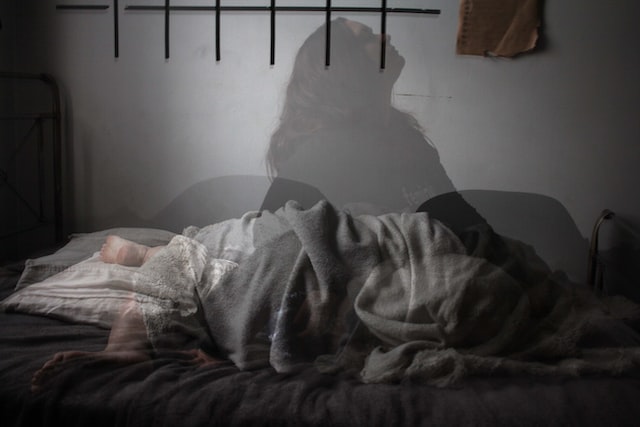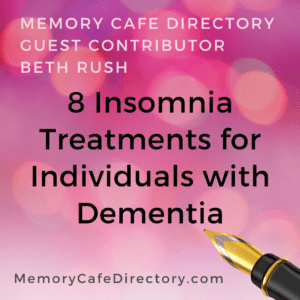Memory Cafe Directory posts and/or links to retailers can be advertising, sponsored, or affiliate links. We may earn a small commission from them. Thank you.
The link between sleeping and dementia is as complex as in many chronic illnesses. Insomnia treatments are often the answer. The condition makes falling and staying asleep more challenging, but a lack of adequate shuteye increases disease symptoms. Around and around the vicious cycle you go.
A holistic approach works well when treating insomnia in patients with dementia, as such methods address multiple factors affecting sleep loss. However, researchers continue investigating new techniques and medications to improve protocols.
What should you know as a caregiver of someone with dementia and sleeping issues? Here’s what you should know about insomnia treatments for individuals living with dementia. But first a reminder: always consult a health professional with detailed questions about your particular circumstance.
The Link Between Sleeping and Dementia
Sleeping and dementia share a complicated relationship. Scientists still don’t understand precisely what happens when humans and animals rest, but studies on both show slumber plays a crucial role in learning and memory.
It impacts your mental abilities in three ways:
- Insomnia may lead to hallucinations. Sleep deprivation has the potential to cause hallucinations due to disturbances in visual processing.
- Sleep deprivation robs you of focus. Without rest, it’s harder for new neuronal connections to form and learning to occur.
- Sleep consolidates memories. When you rest for the night, your brain forms memories into meaningful patterns, helping you recall vital information later.
A lack of concentration isn’t the only adverse health effect of sleep deprivation. Individuals with chronic insomnia often experience complications such as headaches and mood swings, making them more difficult to treat.
Patients with chronic conditions often struggle with sleep deprivation. You might be familiar with the pattern if you have worked with patients with resistant pain. Their aches make it impossible to find a comfortable position, so they toss and turn. Their inability to sleep leads to frustration and anxiety, making it harder to fall under. When they finally stumble out of bed after a night of broken rest, their symptoms increase from the lack, perpetuating the cycle.
The problems with dementia patients are slightly more complex, thanks to their declining cognitive abilities. For example, they may awaken during the night to use the restroom and become disoriented, distracting themselves with an unrelated task like cooking eggs at 2 a.m. They often experience daytime sleepiness and nighttime restlessness or may get up in the predawn hours thinking it’s time to go to work.
As the disease progresses, people with dementia often sleep more and more as their brain damage becomes more extensive and their bodies weaken. However, some patients completely reverse their patterns, sleeping all day and remaining awake all night, frustrating caregivers. Those with Parkinson’s disease or dementia with Lewy bodies are most likely to make this shift.
In the early stages, caregivers should limit daytime sleeping to catnaps, even if individuals try to catch up from a night of tossing and turning. Encouraging lengthy naps further disrupts nighttime rest. Follow your heart and your doctor’s advice as the disease progresses.
8 Holistic Insomnia Treatments for Individuals with Dementia
Holistic strategies for sleeping and dementia consider more than the patient’s diagnosis. They encompass lifestyle and stress mitigation practices to bring about optimal slumber conditions. You might employ the following strategies to help those in your care get adequate rest.
1Improve Your Diet
Diet can influence dementia risk. Ultra-processed foods — such as soft drinks, cookies and many convenience meals — increase your chances of developing the disease. Fortunately, a diet rich in whole foods close to their natural forms encourages better outcomes and sleep.
Certain foods might do double-duty when helping with sleeping and dementia. For example, cherries contain high melatonin levels, a vital sleep hormone enabling you to get the rest you need. Perhaps you can serve a healthy fruit salad as an after-dinner dessert.
2Lights Out
Even a tiny bit of light can disrupt slumber for some. This rule includes those little LEDs glowing behind the power switches of many electronic devices. If your patient refuses to take the television out of the bedroom — your best option — you can use specialty stickers to block the gleam.
Removing all electronic devices is better, but computers and cell phones are no-nos. The blue light screens emit can affect melatonin production and you need plenty of this hormone to fall and stay asleep. Create a charging station elsewhere in your home and unplug at least 30 minutes before bed. Encourage your patient to use this time for gentle stretching, meditation or quiet reading.
A completely dark bedroom is best for slumber, but that situation creates headaches for caregivers. How can you check on a patient you can’t see? Fortunately, you can find specialty bed sensors that alert you and turn on a light if they try to get out of bed during the night, decreasing fall risk and helping you guide them to safety.
3Get on Schedule
It’s vital to maintain a regular bedtime. Getting up and lying down at the same time each day trains your circadian rhythms, the sleep-wake patterns influencing when you start to feel tired. However, you need to reinforce these habits on weekends as well for the best effect.
Research into circadian rhythms shows how vital maintaining a routine is to overall health. In addition to sleep, these patterns balance your digestive system and metabolism. A sluggish metabolism contributes to excess weight gain that complicates health outcomes.
Furthermore, these sleep patterns impact human immunity. Cytokines are proteins your body uses to fight infection and induce sleepiness. This relationship suggests adequate rest is vital to helping the body conserve energy for fighting disease.
4Cool It Down
Does your patient keep their home relatively warm? Many people with dementia are physically frail and relatively inactive, meaning they lack the requisite reserves to stay warm. However, trying to sleep in muggy conditions can result in broken slumber.
The optimal sleep temperature is between 60° and 67° Fahrenheit, but some patients may balk if you dial it down that low. Your solution? Invest in a programmable thermostat. You can set it to decrease shortly before bed and more so after your patient typically falls asleep, returning to normal at their regular wake time. This method also serves as a sensory trigger and may cue the individual to stay in bed until it’s time to rise if early morning waking is a problem.
5Plan Your Movement
Gentle exercise is glorious for inducing sleep. However, you have to time it correctly. Getting your blood flowing too close to when you lie down can keep you tossing and turning into the wee hours.
Your best bet is to have your patient exercise in the morning. If they must do evening movement, time it so they finish at least 90 minutes before bedtime. It allows time for their endorphins and core body temperature to return to levels more favorable to slumber.
6Wind Down
Sensory triggers can be huge in helping regulate your circadian rhythms — temperature is only one method. A quality wind-down routine can also help your patient establish the right mindset for sleep.
Wrap up the day at least two hours before bedtime, allowing them room for a quick, light snack and relaxation. Their evening routine might consist of mundane activities, like brushing their teeth, washing their face and sliding into their favorite silky pajamas.
You can also use cues like quiet music — some people swear by solfeggio frequencies and binaural beats for inducing slumber. Dimming the lights is another sensory cue. Install dimmer switches or invest in some fun and colorful LEDs to cast their bedroom in a lavender glow.
7Stretch It Out
Stretching can help your patients sleep better by easing the minor aches and pains causing them to toss and turn at night. It also improves blood flow and relieves tension and stress.
Fortunately, you don’t have to go far to find evening yoga and gentle stretch routines you can do right on your mattress. YouTube is a fabulous resource for free videos.
8Enjoy a Bedtime Story
Yoga isn’t the only thing you can find on YouTube to help you sleep. You’ll also find a world of sleep hypnosis and meditation videos that can coax you into dreamland.
What if you want a change? There’s nothing wrong with falling asleep to an old-fashioned bedtime story. Fortunately, you can find free collections in genres from romance to horror, thanks to podcasters who cross-publish their offerings to YouTube.

Photo by Megan te Boekhorst on Unsplash
When to Ask Your Doctor About Insomnia Treatments
What if your holistic insomnia treatments fail to bring the relief you seek? It’s wise to talk to your doctor about medications that may help. For example, the FDA recently approved Belsomra for people who struggle with sleeping and dementia. It works on orexin, a neurotransmitter involved in the sleep-wake cycle.
In general, you should discuss changes in sleep lasting longer than four weeks or which cause difficulty with daytime activities and the ability to function. Alerting the physician of symptom changes can alter your recommended treatment course.
Sleeping and Dementia — Troubles and Treatments
A complicated link exists between sleeping and dementia. The disease can disrupt typical patterns and a lack of sleep can exacerbate symptoms.
Follow the tips above if you care for someone with this condition. A combination of holistic and medical interventions can help your loved one get the rest they need.
About the Author
Beth Rush

Beth Rush
Beth Rush is the Managing Editor and Content Manager at Body+Mind.
Body+Mind features articles about diet, fitness, mental health, parenting and health care.
Become a Contributor!
 Do you want to be a Memory Cafe Directory contributor? If you have helpful information to share with our community, read about the guidelines, then get in touch to discuss what you have to offer.
Do you want to be a Memory Cafe Directory contributor? If you have helpful information to share with our community, read about the guidelines, then get in touch to discuss what you have to offer.
Thank you.





